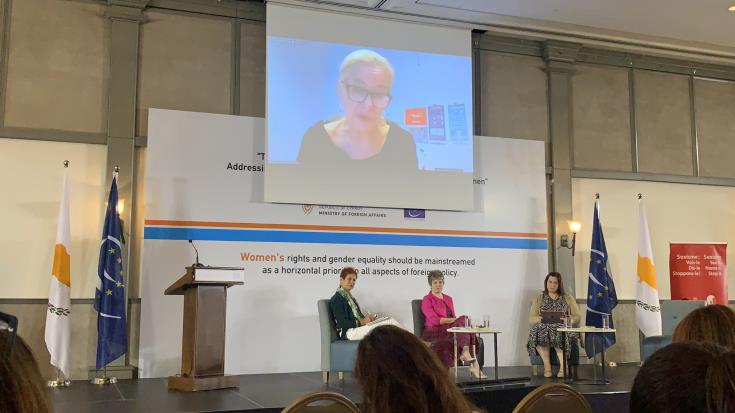Experts on gender equality and women’s rights warned about the danger of not just failing to achieve the aspirations set by the international community, but of even witnessing a rollback in this field. Addressing a panel on Tuesday morning, in Nicosia, representatives from the Parliamentary Assembly of the Council of Europe (PACE), the European External Action Service (EEAS) and the United Nations, emphasised the role of multilateralism in advancing women’s rights and spoke about the need to work together.
The panel, held in the framework of a conference on “the role of foreign policy in advancing gender equality” was organised by the Ministry of Foreign Affairs of the Republic of Cyprus, in partnership with the Council of Europe. Elvira Kovács, Vice-chairperson of the PACE Sub-committee on Gender Equality of the Committee on Equality and Non-Discrimination, told participants that “there are some steps forward, but we see a backlash in different countries and we still need to work together.”
She referred, moreover, to the Istanbul Convention on preventing and combating violence against women and domestic violence, the “most important instrument of the Council of Europe” in this respect and underlined the need to see more ratifications by member states and to “explain to people not to be afraid by the term gender.”
“There is a sense of urgency” for gender equality and women’s right, said Alia El-Yassir, the Regional Director for Europe and Central Asia at UN Women, as “we are in danger of not only not achieving the aspirations, but of actually rolling back in these rights.”
For El-Yassir, a shift in paradigm is necessary. “In the last 10 years we have seen this growing movement of this so called antigender ideology” she noted. For the UN official, this ideology is threatening to undo decades of work and activism, that has been undertaken by multiple stakeholders, including many member states represented in the Council of Europe and in the UN.
“Whereas the concept of gender was developed to really unpack what was socially constructed in terms of characteristics of people, this movement, this antigender ideology is actively working against gender as a concept to be socially accepted,” she explained.
She spoke of a big shift that happened in the last 10 years, and said that it is difficult to look at the arguments used by this movement because “there are no real standards, there is no consistency and there is no coherence.”
“We are trying to grapple with something the multilateral systems are not adapted to do. That is why we need to shift this paradigm,” she went on. “Gender is currently being equated with perversity, with threat, and it is seen as a foreign invasion in many places, an infiltration,” she noted.
El-Yassir says that intergovernmental organisations like the UN, the Council of Europe (CoE) and the EU need to do things “a little bit differently, and foreign policy does play a really critical role in this.”
Stella Ronner-Grubačić, EEAS Ambassador for Gender and Diversity, addressed the panel virtually, saying that the pandemic has exacerbated inequalities, while increasing enormously the level of gender-based violence.
The EU has set up a recovery fund which provides substantial amount to countries to deal with the pandemic and its aftermath, she went on and pointed to the “robust framework” the EU has in place on gender equality and women empowerment in foreign policy, through its “Gender Action Plan III.”
Coming up with various strategies is easy, implementing them is the real hard work, the Ambassador said and pointed to the situation in Afghanistan and the need to implement the international community’s initiatives and commitments with regard to the situation of women and girls in the country.
“The only way to do this is by working all of us together. It is through joint efforts and cooperation that we are at our best” Ronner-Grubačić said, emphasizing the EU determination to continue strengthening cooperation with organisations like the CoE and the UN, as well as with NATO, G7 and G20. Asked about the way ahead by the panel coordinator, Kalliope Agapiou-Josephides, an Assistant Professor at the University of Cyprus’ Department of Social and Political Sciences and Jean Monnet Chair in European Political Integration, the EEAS official said that “we need to lead by example” and make an effort to show that we want to change and how we can go about that.
The conference in Nicosia, which is ongoing, is expected to conclude in the afternoon.






